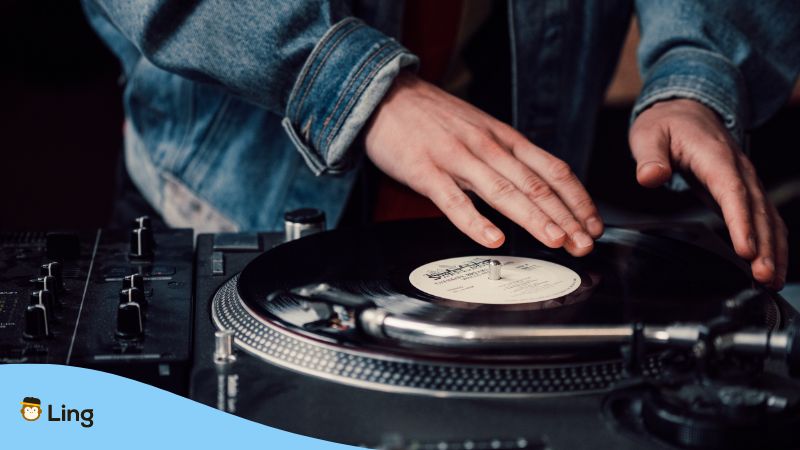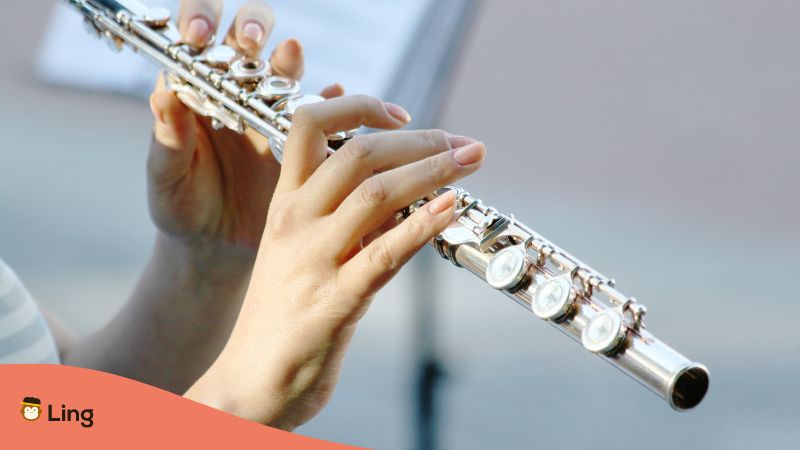Greetings, music lovers! Are you ready to expand your vocabulary and impress your friends with some Chinese words and music jargon? Look no further because we’ve got you covered with these easy-to-learn words about music in Chinese!
So, whether you’re a music enthusiast or just looking to expand your linguistic horizons, this post is for you. Get ready to jam out with some new words about music in Chinese!
Importance Of Music In Chinese Culture
Before we begin, let’s first talk about the Chinese word 音乐. These two Chinese characters are a beautiful combination of two characters that represent sound and joy. Together, these two characters form a word that embodies the essence of music: the joy and pleasure it brings through the sounds it produces.
You may be wondering, “Why do I need to learn Chinese music terms?” Well, my dear friend, music has been an integral part of Chinese culture for centuries. So, understanding these Chinese words and phrases can enhance your appreciation of the art form. Plus, who doesn’t want to sound like a pro when discussing their favorite tunes with Chinese-speaking friends?
In Chinese culture, music is more than just a catchy tune to dance to. It’s an art form with deep roots and profound significance. From traditional court music to modern pop, music has played an essential role in the lives of the Chinese for centuries.

Chinese Words About Music Genres
Ready to take your love for music to the next level? From upbeat and catchy pop to rebellious and loud rock music, China has various styles that will make you want to dance, sing, or headbang!
In this section, we’ve compiled a list of essential Mandarin music vocabulary with easy-to-understand English translations.
Pop Music – 流行音乐 (Liú Xíng Yīn Yuè)
Pop music is China’s most popular genre, characterized by catchy melodies, upbeat rhythms, and easy-to-remember lyrics. It covers various sub-genres, such as Mandopop (Chinese pop), Cantopop (Hong Kong pop), and Taiwanese pop.
Rock Music – 摇滚音乐 (Yáo Gǔn Yīn Yuè)
Rock music emerged in China in the 1980s, symbolizing youth rebellion and freedom of expression. Its distinctive sound features electric guitars, drums, and strong vocals. Moreover, it often tackles social and political issues.
Classical Music – 古典音乐 (Gǔ Diǎn Yīn Yuè)
Classical music has a rich history in China which dates back to the Tang Dynasty (618-907 AD). It is characterized by intricate melodies, complex rhythms, and traditional Chinese instruments like the erhu and pipa.
Jazz Music – 爵士乐 (Jué Shì Yuè)
Jazz music in China had its roots in the 1920s when foreign musicians introduced it. It is known for its improvisation, swing rhythms, and bluesy melodies. Moreover, it often incorporates elements of traditional Chinese music.
Hip-hop Music – 嘻哈音乐 (Xī Hā Yīn Yuè)
Hip-hop music is a relatively new genre in China. But it has recently gained much popularity, especially among young people. It features rap music vocals, electronic beats, and a bold and rebellious attitude.
Folk Music – 民间音乐 (Mín Jiān Yīn Yuè)
Folk music has a long history in China, reflecting different regions’ diverse cultures and traditions. It often features acoustic instruments like the guzheng and dizi and tells stories of rural life, love, and nature.
Electronic Music – 电子音乐 (Diàn Zǐ Yīn Yuè)
Electronic music has become increasingly popular in China, especially among the younger generation. It features electronic instruments and synthesizers, ranging from ambient and chillout music to techno and house.
Country Music – 乡村音乐 (Xiāng Cūn Yīn Yuè)
Country music is a genre that has recently gained popularity in China, featuring acoustic guitars, banjos, and fiddles. It often tells stories of life in rural areas and has a laid-back and nostalgic feel.
R&B Music – 节奏布鲁斯音乐 (Jié Zòu Bù Lǔ Sī Yīn Yuè)
R&B music originated in the United States but recently gained a following in China. It features soulful vocals and rhythmic beats. Moreover, it often incorporates elements of hip-hop and electronic music.

Music Instruments In Chinese
Are you ready to dive into the world of musical instruments in Chinese? If you want to learn how to say the names of different Chinese instruments, you’ve come to the right place!
Here are a few examples of musical instruments in Chinese:
Guitar – 吉他 (Jí Tā)
First up, we have the guitar or 吉他 in traditional characters. The guitar is a classic stringed instrument that can be played in various genres, from rock to country to blues.
Whether you’re strumming some chords or shredding a solo, the guitar is a versatile instrument that can be used to create a wide range of sounds.
Chinese Violin – 二胡 (Erhu)
The two-stringed erhu, sometimes known as the “Chinese violin,” is renowned for its soul-stirring tunes. The erhu is an instrument that has been a mainstay in traditional Chinese music for more than a thousand years. Its gloomy tones have the capacity to stir the soul and arouse strong emotions.
Saxophone – 萨克斯管 (Sà Kè Sī Guǎn)
Another member of the brass family is the saxophone or 萨克斯管 (sà kè sī guǎn) in Chinese. The saxophone is a versatile instrument that can create everything from smooth jazz to funky soul.
With its smooth, sultry sound, the saxophone is an instrument that can really set the mood.
Violin – 小提琴 (Xiǎo Tí Qín)
Moving on to the strings, we have the violin or 小提琴 (xiǎo tí qín) in Chinese. The violin is a beautiful instrument that produces a rich, warm sound that can be used to create everything from classical music to folk songs. With its delicate sound and intricate fingerwork, the violin is an instrument that requires skill and patience to master.
Lute – 琵琶 (Pipa)
The four-stringed lute known as the pipa is a graceful and elegant instrument. It has been practiced for ages and is known for its adaptability. The pipa can express a variety of feelings, whether it’s a joyous folk song or a somber classical composition.
Zither – 古琴 (Guqin)
The seven-stringed instrument known as the guqin has a special position in Chinese culture. Playing the guqin demands both technical prowess and a strong spiritual bond, which is why it is frequently linked with academics and poets. Listeners are taken to a peaceful world by its calm tones.
Bamboo Flute – 笛子 (Dizi)
The bamboo flute, known as the dizi, represents China’s kinship with the natural world. Its airy sounds resemble the murmur of rivers and the whisper of the wind. The dizi, which is used in both traditional and popular music, gives Chinese compositions a peaceful feel.
Reed Flute – 笙 (Sheng)
Sheng, a captivating Chinese instrument, enchants with its ethereal harmonies produced by a cluster of bamboo pipes, each carefully tuned to create a mesmerizing symphony that echoes through centuries of musical tradition. Its unique blend of ancient craftsmanship and haunting melodies has made it a timeless gem in the world of Chinese music.
Drum – 板鼓 (Bangu)
Bangu, also known as Gu, stands as a compelling emblem of Chinese percussion, characterized by its sturdy wooden frame drum and the rhythmic heartbeat it provides to traditional Chinese orchestras. With its resounding beats and distinctive resonance, Bangu/Gu is a vital force in driving the captivating rhythms that underpin the grand tapestry of Chinese musical heritage.
Bass – 贝斯 (Bèi Sī)
Next up, we have the bass or the Chinese word 贝斯 (bèi sī). The bass is a crucial instrument that provides the low end of the music, anchoring the sound and giving it depth and texture. Whether you’re playing in a rock band or a jazz ensemble, the bass is an instrument that can really round out the sound.
New Flute – 新笛 (Xindi)
Xindi creates enchanting melodies using bamboo tubes of varying lengths, producing a charming, flute-like sound that dances with the wind. Its simplicity and sweet tones make it a delightful addition to traditional Chinese music.
Flute – 长笛 (Cháng Dí)
Moving on to the woodwinds, we have the flute or 长笛 (cháng dí) in Chinese characters. The flute is a delicate instrument that produces a light, airy sound that can be used to create everything from classical music to folk songs.
With its intricate fingerwork and breath control, the flute is an instrument that requires skill and precision to master.

More Vocabulary Words About Music In Chinese
Want to learn more? Get ready to take your Chinese language skills to the next level with this exciting list of music-related vocabulary! From musical notes and symbols to types of instruments, these words will help you easily express your passion for music in Chinese.
So, let’s rock out and explore some more awesome vocabulary!
Master Words About Music In Chinese
Have you learned all the words? Learning basic words about music in Chinese can be a fun and rewarding experience. Whether you’re a beginner or looking to improve your proficiency in Chinese, adding Chinese vocabulary related to music can be a great way to immerse yourself in the language and culture.
Learn Chinese With Ling
Are you ready to take your language skills to the next level? Say hello to the Ling app! The ultimate language learning tool that will have you speaking like a local in no time.
With the Ling app, you’ll never have a dull moment while learning a new language. Our app is jam-packed with fun and engaging lessons to keep you motivated and entertained. From interactive quizzes to real-life conversations, you’ll be amazed at how quickly you pick up new vocabulary and grammar rules.
So what are you waiting for? Download the Ling app on App Store or Play Store today and start your journey to fluency!

















